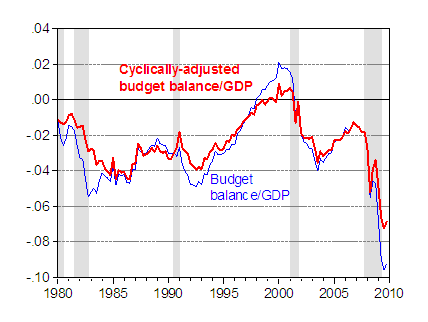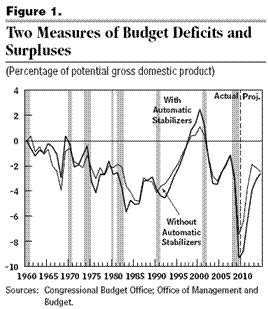The CBO has just released new estimates of the cyclically adjusted, or structural, budget balance (link here). They’ve also given the series a new name, and some new tweaks. First, observation — the cyclically adjusted deficit is substantially smaller than the actual in 09Q4.

Figure 1: Federal budget balance with (blue) and without automatic stabilizers (red bold). NBER defined recession dates shaded gray; assumes last recession ended 09Q2. Source: CBO (May 2010), 2010Q2 2nd GDP release, NBER and author’s calculations.
The improvement in actual and cyclically adjusted budget balance will continue going forward, according to the CBO’s forecasts and projections. Figure 1 from CBO, “The Effects of Automatic Stabilizers on the Federal Budget” (May 2010), plots projected balances against projected potential GDP.

Figure 1: from “The Effects of Automatic Stabilizers on the Federal Budget” (May 2010).
The usual caveats apply. The projections of the actual and cyclically adjusted budget balances are under current law. To me, it’s interesting that the cyclically adjusted budget balance in will be above its value over most of the 1981-88 period, and is smaller than any deficit in the 2003-08 period excepting 2007 (JGTRRA is implemented starting in 2003).
i am surprised it is not a positive number, after all deficits and debt don’t matter, do they?
Hi. Menzie. I haven’t had time to follow this blog much lately. A little less doom and gloom if we look at the cyclically adjusted guesstimate of budget balance? The near future may become an outlier. I glanced at the OMB guesstimate of the fiscal year 2011 budget and future forecasts of net interest payments under the rosiest of assumptions for potential GDP and was quite frankly scared. A little more lolly gagging and drunken spending by Congress which is virtually assured. A little more spread the wealth by Mr. Hopey Changy which is virtually assured. A little less GDP due to efforts to make the oceans recede along with the aforementioned and we could be Greece in only four years. Who is gonna bail us out?
I see that what Krugman has tagged “conventional madness” has arrived in the Econobrowser comments section.
http://krugman.blogs.nytimes.com/2010/05/27/conventional-madness/
No surprise that it has arrived right along with the “hopey-changey” sneer.
Yes, we need vastly better budget discipline in good times. What we don’t need is to confuse that need with a need for fiscal contraction now. The whole unfunded-war/unfunded-part-D/tax-cuts-during-expansion-to-destroy-budget-balance episode is still with us, and accounts for a great deal of the cyclically adjusted deficit. Those errors need to be addressed. Cutting off jobless benefits and support to state budgets now is not going to re-balance the cyclically adjusted budget, but could well stall the recovery.
Taste of things to come: NJ Transit raised the cost of a monthly pass from Princeton (my home) to NY Penn Station from $331 to $414, or 25%. Daily parking was also raised 25%, from $4 to $5.
Add to that the NY subway, up about $2 per day, and you have a net increase in cost of commuting (all public) by $1,500 on an annual basis–all in the period of two months. And, of course, there’s now the commuter tax of, I think, $400 per head for those coming into NY–that’s borne by the employer.
Think I ought to move the office back to Princeton?
Jim –
Could you do a bit for us on the impact of auditing on the Fed?
Bernanke has stated that the Fed would lack independence if it were audited. But major corporations and banks are audited. Is their independence compromised? Only to the extent they want to do something tricky. So what’s the deal with the Fed?
Also, Bernanke wants ‘independence’. And yet, under both Greenspan and Bernanke, the Fed has seemed highly political and spineless. (Neither is a Volcker.) I believe Greenspan said something to the effect that the Fed couldn’t pop the housing bubble because Congress would not have supported it. (Do I have this right?) If that’s so, wasn’t the Fed’s independence already compromised? Isn’t the independence of the Fed first and foremost a function of the character of its Chairman?
Agree with Steven K above. The surprising thing to me is that Volcker is not an economist, whereas both AG and BB are. I would have expected something of the reverse in their behavior knowing only this fact.
With all due respect kharris. Imo, Krugman is conventionally mad. As to all the unfunded items you mentioned, I gather you meant to say untaxed? If they were unfunded, how on earth was the money spent? How does taking more money away from the private sector to funnel it through the federal government to support state governments that overpromised as well, help a recovery?
You simply cannot take a static Keynesian measurement of GDP and say, look the private sector did not spend enough so if the government makes up the difference, GDP next time we measure will be back where it was. The economy is not a simple problem of arithmetic. It is dynamic. It reacts to perceived threats by pulling its head into its shell. Probably pointless to argue with someone that reads Paul Krugman with a straight face.
“A little less GDP due to efforts to make the oceans recede along with the aforementioned and we could be Greece in only four years. Who is gonna bail us out?”
Meh? What crisis in Greece? If you still believe in that, you are part of the elite.